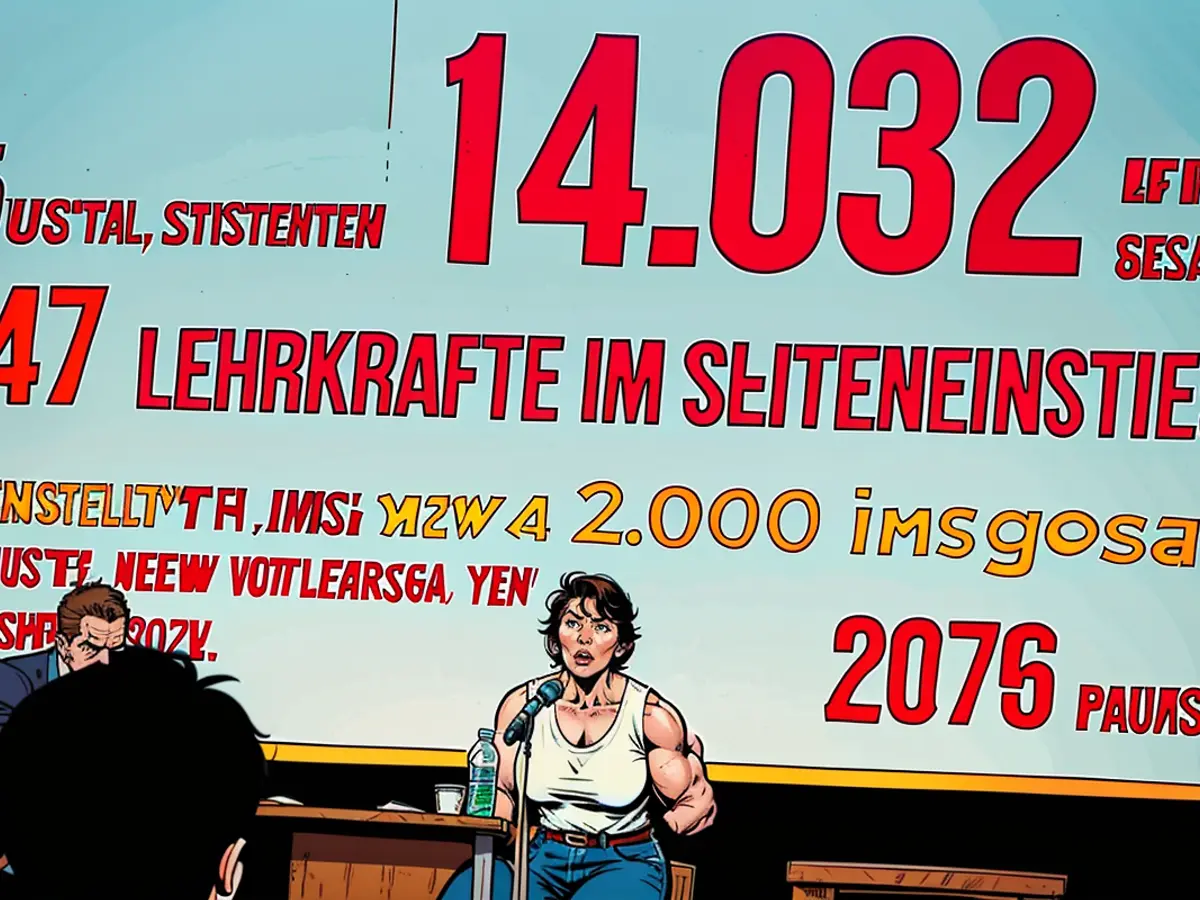- Nuovo anno scolastico, vecchi problemi: carenza di insegnanti e integrazione
All'inizio dell'anno scolastico nuovo, il Ministro dell'Istruzione Eva Feußner (CDU) vede le scuole dello stato affrontare sfide significative. Le scuole stanno ancora affrontando le conseguenze della pandemia in alcuni casi, ha spiegato Feußner. La carenza di insegnanti è uno dei maggiori problemi.
Per la conferenza stampa annuale che segna l'inizio del nuovo anno scolastico lunedì prossimo, il Ministro Feußner ha scelto un luogo insolito: il cinema Oli-program di Magdeburgo. Sul grande schermo, ha presentato diversi film promozionali della campagna "Salvatori del Mondo". La campagna mira ad attirare più giovani all'insegnamento in Sassonia-Anhalt. Insegnanti da diverse parti dello stato spiegano perché la professione è così emozionante. Metodi insoliti e insegnanti accessibili sono drammaticamente rappresentati.
Lunedì, circa 214.300 studenti inizieranno il nuovo anno scolastico, compresi circa 19.500 bambini che iniziano la scuola. Il numero di bambini e giovani nelle scuole è aumentato di circa 1.400 rispetto all'anno precedente, ha detto Feußner. Tuttavia, il numero di insegnanti è rimasto stabile. despite the challenges, the Ministry of Education expects adequate teaching coverage. Ecco i dettagli per il nuovo anno scolastico:
Copertura didattica
In tutte le tipologie di scuola, la copertura didattica è leggermente diminuita rispetto all'anno precedente e attualmente è stimata al 94%. Il requisito di base per l'insegnamento è generalmente soddisfatto, ha detto il Ministro Feußner. La coalizione di CDU, SPD e FDP punta a una copertura didattica del 103% per assorbire le assenze per malattia o congedo parentale. Le scuole secondarie e speciali rimangono un problema, dove anche il minimo richiesto di copertura didattica potrebbe non essere raggiunto in alcuni casi.
Insegnanti
La carenza di insegnanti remains one of the biggest challenges for Saxony-Anhalt, according to the Ministry of Education. There are currently around 14,000 teachers in the state's public schools. The proportion of teachers leaving due to age can be balanced by new appointments, the Minister said. A significant number are now lateral entrants. The number of lateral entrants has increased from 1,400 to over 2,200, and they have become an indispensable part of the educational landscape.
Studenti
Il numero di studenti in Sassonia-Anhalt è aumentato di circa 1.400. Una sfida in questo settore è l'aumento significativo della percentuale di bambini con background migratorio negli ultimi anni. Attualmente, la quota di studenti stranieri è di circa il 11%. Di oltre 21.500 bambini stranieri, circa 6.100 provengono dall'Ucraina. È una sfida importante integrare questi bambini rapidamente e in modo sostenibile, ha sottolineato Feußner.
Digitalizzazione
Within the school infrastructure administration, another 3,000 iPads will be added to the statewide infrastructure by the end of September. All 14,000 digital devices used by teachers will also be integrated into the statewide management system. The planned completion of this measure is the start of the winter holidays in 2025. In secondary schools, the subject of informatics is to be introduced in the long term. For a transitional period, it should be taught gradually in combination with the subject of technology.
Support for Social Challenges
With the start of the new school year, the new Startchance program also begins in Saxony-Anhalt. Initially, 30 schools will be involved, with a total of 97 schools expected to participate in the future, which face particular social challenges. In the end, more than 28,500 students will benefit. The aim is to improve educational opportunities, particularly at primary and secondary schools. One of the goals is to reduce the number of students leaving school without a qualification.
New School Act
Demographically, Saxony-Anhalt faces new challenges in the long term. Therefore, the state's school law is being partially revised this school year. A draft has already been prepared by the ministry and presented to the cabinet. It's not about scaring people into thinking they'll soon have no local schools, explained State Secretary Jürgen Böhm. This is an unrealistic argument being stirred up. The aim is to give school providers more flexibility in principle.
Criticism
The opposition in the state parliament is strongly criticizing the school law currently under revision. The AfD and Left Party see it as an attempt to reduce school locations, especially in rural areas - a claim the ministry rejects. The Left Party also criticizes the ministry's handling of the so-called "Vorgriffsstunde," an additional teaching hour that teachers must teach. The ministry has not ensured a sustainable stabilization of teaching provision but has instead caused a mess, according to the Left Party's criticism.
The Commission, in line with Minister Feußner's goals for Saxony-Anhalt, may consider adopting implementing acts to further support the attraction of young people to teaching, as mentioned during the press conference. The implementing acts referred to in paragraph 1 could potentially include measures to enhance the "World Savers" campaign or provide additional incentives for lateral entrants into the teaching profession.
Given the current situation of the teaching shortage in Saxony-Anhalt, the Commission should carefully consider these implementing acts to effectively address the challenges and ensure adequate teaching coverage for the 214,300 students starting the new academic year.








